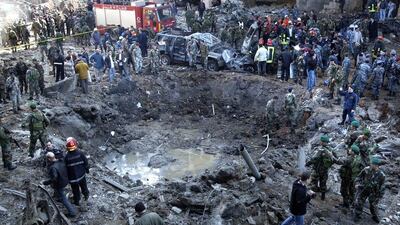BEIRUT // The trial of four Hizbollah members accused in the assassination of the former Lebanese premier, Rafiq Hariri, will finally begin tomorrow in the Hague with the divisions surrounding his death exacerbated by the civil war in Syria.
Hariri was killed along with 22 people, including a suicide bomber, when a van packed with 2,500 kilograms of TNT exploded next to his motorcade on February 14, 2005.
The 60-year-old billionaire businessman is credited with helping to rebuild Lebanon from the ruins of its civil war.
His assassination triggered what the opposition March 14 coalition refers to as the Cedar Revolution – mass demonstrations that precipitated a withdrawal in late April of Syrian troops which had been stationed in Lebanon since 1976.
The Special Tribunal for Lebanon was established by the United Nations in 2009 to bring those responsible for the bombing to justice.
But the political calculus in Lebanon has changed immeasurably since then, with the trial overshadowed by recent suicide bombings, sectarian clashes and a Syrian refugee crisis.
“The Hariri murder has been dwarfed by what happened in the Middle East over the past three years, and the war in Syria has dropped all the niceties that come with power-sharing and the sectarian balance of Lebanon,” said Sami Moubayed, a historian and former Carnegie scholar.
“The trial, long overdue, will just add to the mess.”
The Syrian regime of Bashar Al Assad was initially blamed for killing Hariri, a Sunni who had twice served as prime minister.
The four members of Hizbollah, a Shiite militant group, were indicted by the tribunal in June 2011 and will be tried in their absence near the Hague.
Two of the men are accused of direct involvement in the bombing and two others who allegedly orchestrated an alleged false claim of responsibility for the attack. A fifth conspirator was indicted in July last year.
At the centre of the tribunal’s case is telecommunications evidence that the prosecution claims shows a surveillance network that tracked Hariri using mobile phones and killed him using 2,500kg of explosives as his motorcade drove past the St George Hotel.
Hizbollah has claimed that Israel was behind the assassination and the group’s leader, Hassan Nasrallah, has decried the court as a Zionist-American conspiracy and pledged to “cut off the hand” of any who attempt to arrest party members in connection with the attack.
The most senior of the four Hizbollah operatives linked to the assassination is Mustafa Badreddine, who was convicted in 1984 for coordinating the bombing of the American and French embassies in Kuwait and sentenced to death, only to be set free during Saddam Hussein’s invasion.
Badreddine is accused of being the “overall controller” of the assassination team while Salim Ayyash is alleged to have coordinated the assassins.
Badreddine, Ayyash and three others will be represented by an independent defence counsel appointed by the tribunal.
While Hizbollah has refused to accept the legitimacy of the tribunal, its intervention on the side of the Assad regime in the Syrian civil war has had severe repercussions for Lebanon.
Mr Nasrallah first admitted its involvement in May last year when it helped Mr Al Assad’s forces recapture the rebel-held border town of Qusayr.
Hizbollah and Iran support Mr Al Assad, who belongs to a sect that is a Shia offshoot, and Mr Nasrallah argues that the war in Syria is an existential battle against predominately Sunni rebels trying to overthrow the Syrian regime.
Bombings have hit the capital since Mr Nasrallah admitted his militia were fighting in Syria. He has blamed extremist Sunni rebels who oppose Mr Al Assad of carrying out attacks on Hizbollah-controlled areas and the bombing of the Iranian embassy in the city.
Attacks have also targeted Sunnis, the most high profile of which were the assassination in December last year of Mohammed Chatah, a senior aide to former prime minister Saad Hariri, Rafiq’s son, and the killing of Lebanon’s former intelligence chief, Wissam Al Hassan, who was also close to Hariri.
A Lebanese investigation has also linked a senior Alawite leader of a pro-Assad political party in Tripoli to the bombings, provoking further clashes between Sunnis opposed to Mr Al Assad and the minority Alawites who back him in Tripoli.
The Syrian war has also stretched Lebanon’s resources to the limit. According to the UN High Commissioner for Refugees, nearly 870,000 people have fled the violence into Lebanon.
Refugees now make up almost 20 per cent of the population, placing immense pressure on the country’s education, social and health services.
Lebanon has dithered on whether to build refugee camps for Syrians, worrying about the effects of a permanent Syrian presence on the delicate population balance and security situation.
Lebanon also suffers from a leadership vacuum at all levels of government. Progress in efforts to form a new consensus cabinet, nearly 10 months after the resignation of the caretaker prime minister, Najib Mikati, have stalled.
Lebanon’s delicate sectarian balance is reflected in a complex political arrangement in which the premiership is reserved for a Sunni while the president must be a Christian and the speaker a Shiite.
But amid the instability, it has been impossible for such consensus-driven politics to be effective.
Parliamentary elections, originally scheduled for June last year, have been postponed until November.
At the heart of the political deadlock is a demand by the anti-Assad March 14 bloc, led by Saad Hariri, that Hizbollah withdraws from Syria, renounces its arms, and surrenders the suspects identified by the Hariri tribunal.
“We need to know who killed every politician in Lebanon, not just Rafiq Hariri,” said Mr Moubayed. “If Lebanon were to be graded on accountability and rule of law, sadly, it would get an F minus.”
“Since everybody is so entangled in the mess, it’s almost as if everybody is guilty of crime in the Lebanese political arena.”
foreign.desk@thenational.ae


